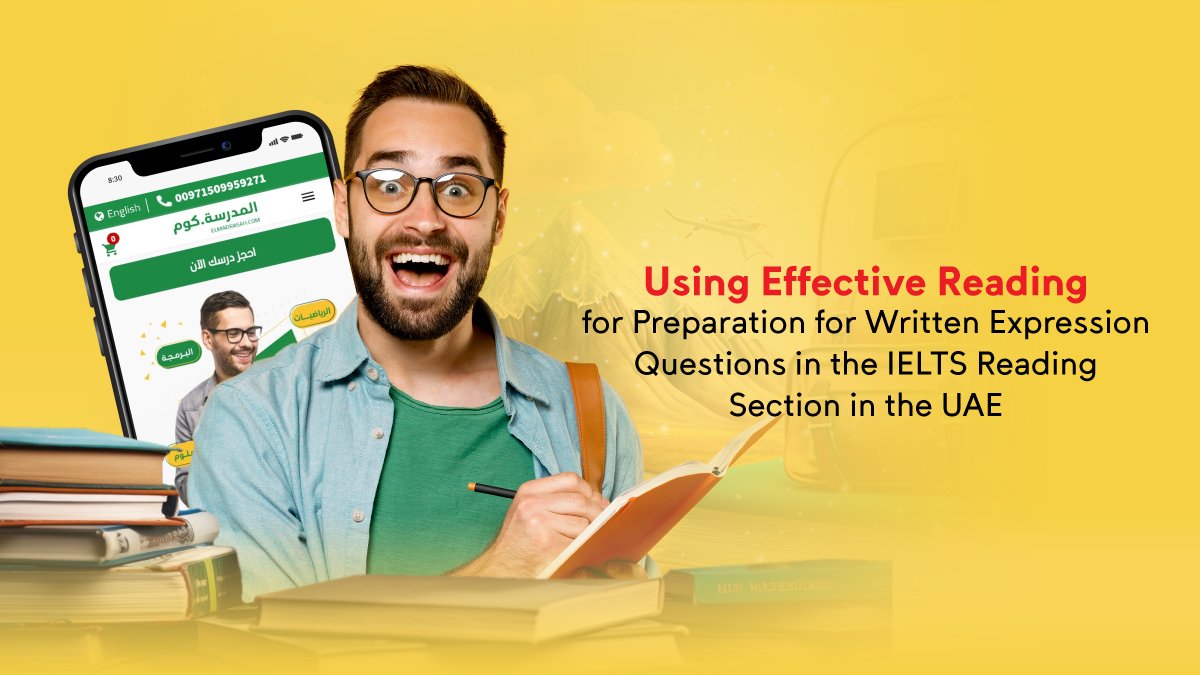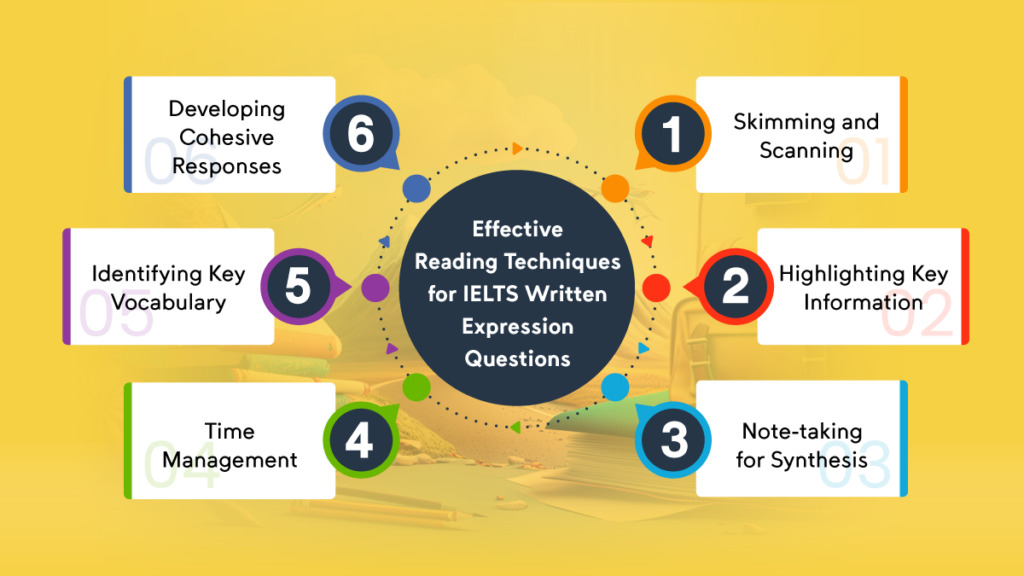
In the dynamic landscape of global education, the International English Language Testing System (IELTS) holds a prominent position, serving as a gateway for individuals aspiring to study or work in English-speaking countries. The IELTS Reading Section is a crucial component of the exam, demanding adept skills in reading comprehension, critical analysis, and effective written expression. This essay explores the significance of using effective reading strategies for IELTS preparation specifically tailored for written expression questions in the IELTS Reading Section in the United Arab Emirates (UAE).
Understanding the Nature of Expression Questions in the IELTS Reading Section
Expression questions necessitate that candidates showcase not only their prowess in comprehending the given texts but also their ability to articulate information thoughtfully. These types of questions go beyond mere regurgitation of facts; they require a sophisticated synthesis of information, challenging candidates to express their ideas in a manner that is both coherent and succinct. Mastery of this section goes beyond having strong reading skills; it extends to being adept at interpreting and effectively conveying information in writing. Therefore, a holistic approach to preparation involves not only honing one’s reading abilities but also developing the capacity to translate that comprehension into well-crafted written responses.
Analyzing Texts: A Fundamental Step in IELTS Preparation
Analyzing texts emerges as an indispensable cornerstone in the comprehensive preparation for expression questions in the IELTS Reading Section. This multifaceted process goes beyond mere surface-level understanding, requiring candidates to delve into the intricacies of written passages. It encompasses the development of a nuanced skill set, including the ability to dissect the text, discern key points, and grasp the author’s overarching purpose and tone. The journey toward mastery involves more than just unraveling the explicit content; it demands an exploration of the subtleties embedded in the author’s language choices and the underlying messages within texts. Successful candidates not only decipher the literal meaning but also cultivate a keen awareness of the nuanced elements, enabling them to respond to questions with a level of depth and articulation that reflects their refined written expression skills. In essence, analyzing texts becomes a dynamic and integral facet of IELTS preparation, fostering a heightened sensitivity to the nuances of language and an adeptness in responding comprehensively to the array of challenges posed by written expression questions in the IELTS Reading Section.
Reading Strategies for IELTS Success
Reading Strategies for IELTS Success are indispensable tools that can greatly influence a candidate’s performance, especially in the challenging Reading Section of the IELTS exam. The effective utilization of strategies, such as skimming, scanning, and intensive reading, holds the key to enhancing one’s ability to not only comprehend but also analyze information swiftly and accurately. Skimming, an invaluable technique, enables candidates to acquire a broad overview of the text, facilitating a quick understanding of the main idea. On the other hand, scanning proves instrumental in pinpointing specific details within the text, allowing candidates to extract relevant information efficiently. However, it is intensive reading that takes the process a step further, demanding a meticulous examination of the content to attain a profound understanding of the nuances and subtleties embedded in the passages. Integrating these multifaceted strategies into one’s regular preparation routine is imperative, as it equips candidates with the skill set necessary for navigating through the diverse and complex reading materials encountered in the IELTS exam. The strategic application of these reading techniques not only ensures a comprehensive grasp of the content but also positions candidates to excel in the varied question types presented in the Reading Section, ultimately contributing to overall success in the IELTS examination.
Preparing for Different Reading Question Types
Preparing for Different Reading Question Types in the IELTS Reading Section is a multifaceted endeavor that demands a comprehensive understanding of the diverse question formats designed to evaluate both reading and written expression skills. As candidates navigate through this section, they are met with an array of question types, each serving as a unique assessment of their ability to comprehend and articulate information from the given texts. This preparatory phase holds paramount importance, as success hinges on the proficiency with which candidates can adapt to the nuances of various question formats.
A myriad of question types awaits candidates in the IELTS Reading Section, each presenting distinct challenges and requiring a tailored approach for effective response. Among the commonly encountered formats are multiple-choice questions, which necessitate not only a profound understanding of the passage but also the ability to discern between nuanced options. Matching headings, on the other hand, demand a strategic alignment of overarching themes with their corresponding sections, challenging candidates to synthesize information cohesively.
True/false/not given questions add an additional layer of complexity, compelling candidates to navigate through subtle nuances within the text to determine the accuracy of statements. Meanwhile, sentence completion questions demand a keen eye for detail, as candidates must fill in the blanks with precise words or phrases derived directly from the passage. Each of these question types serves as a litmus test for the candidate’s adeptness at interpreting information and expressing it in writing.
To excel in this diverse landscape of question types, candidates should embark on a proactive journey of familiarization. This involves not merely recognizing the existence of various formats but delving into the intricacies of each. Understanding the specific requirements of multiple-choice questions, mastering the art of aligning headings with passages, honing the skill of deciphering true/false/not given statements, and practicing precise sentence completion are all integral components of this preparation.
Furthermore, candidates should adopt a strategic mindset, acknowledging that each question type demands a unique set of cognitive and analytical skills. Tailoring their preparation to the specific demands of multiple-choice, matching headings, true/false/not given, and sentence completion questions empowers candidates to approach the IELTS Reading Section with confidence and finesse. The ability to seamlessly transition between these formats not only enhances overall performance but also showcases a well-rounded proficiency in both reading comprehension and written expression.
Effective Reading Techniques for IELTS Written Expression Questions

| Reading Techniques | Description |
|---|---|
| Skimming and Scanning | Techniques for quickly grasping the main idea and locating specific information. |
| Highlighting Key Information | Using highlighting or underlining to identify and retain crucial information. |
| Note-taking for Synthesis | Taking concise and organized notes during reading to aid in synthesizing information. |
| Time Management | Allocating time wisely to read, analyze, and respond efficiently to questions. |
| Identifying Key Vocabulary | Recognizing and understanding key vocabulary to use appropriately in responses. |
| Developing Cohesive Responses | Practice in articulating responses in a clear and cohesive manner. |
Skimming and Scanning for Quick Understanding
Skimming and scanning, two indispensable techniques in the realm of efficient reading, play a pivotal role in swiftly comprehending written content. The art of skimming allows candidates to gain a rapid overview of the main ideas, providing a bird’s-eye view of the text. Simultaneously, scanning involves the targeted search for specific details within the passage, fostering the ability to locate information promptly. Given the often time-sensitive nature of the IELTS Reading Section, honing these skills is paramount. Therefore, candidates are strongly encouraged to engage in regular and deliberate practice of skimming and scanning techniques, cultivating not only speed but also precision in their navigation through extensive and complex texts. This proficiency not only ensures a comprehensive understanding of the material but also equips candidates to respond effectively to a diverse range of written expression questions in the IELTS Reading Section.
Highlighting Key Information
Highlighting Key Information In the realm of effective reading strategies for IELTS, the utilization of highlighting or underlining techniques emerges as an indispensable tool for IELTS candidates. These techniques provide a tangible and active engagement with the reading material, allowing candidates to pinpoint and emphasize crucial information within the passages. The act of highlighting serves a dual purpose – not only does it aid in immediate comprehension by drawing attention to essential details, but it also creates a visual roadmap for future reference. This strategic approach transforms the reading process into a dynamic and interactive exercise, enabling candidates to navigate through the complexities of written passages with greater precision.
Moreover, the benefits of highlighting extend beyond the initial reading phase. When confronted with the written expression questions in the IELTS Reading Section, candidates can rely on their highlighted sections as a robust reference point. This ensures that relevant details are readily accessible, mitigating the risk of overlooking critical information. The visual cues provided by the highlighted segments serve as memory aids, fostering a more efficient recall of key concepts during the response formulation stage. In essence, the practice of highlighting transcends mere annotation; it becomes a systematic and strategic approach that empowers candidates to not only comprehend the material in the moment but also to seamlessly translate that comprehension into well-crafted written responses.
Note-taking for Synthesis
Note-taking for Synthesis is a pivotal aspect of the preparation process for the IELTS Reading Section. Engaging in the practice of taking concise and organized notes while immersing oneself in the reading materials serves as a foundational strategy. This deliberate approach not only aids in comprehension but also plays a crucial role in the synthesis of information. As candidates traverse through the intricate details of the provided texts, the act of note-taking acts as a guide, allowing for the distillation of key concepts and relevant details.
The significance of this practice becomes most apparent when confronted with expression questions in the IELTS Reading Section. The ability to create a coherent and well-structured response hinges on the quality of the notes taken during the reading phase. These notes, acting as a reservoir of distilled information, serve as a valuable resource when formulating responses. Candidates, armed with their organized notes, can swiftly navigate through the complex web of information, ensuring that their written expressions are not only accurate but also concise and directly aligned with the essence of the given text.
Time Management
Time Management is a cornerstone skill crucial for success in the IELTS Reading Section. The effective allocation of time is imperative as candidates navigate through the diverse and often lengthy reading passages. Developing the ability to judiciously distribute time ensures that candidates not only read the material thoroughly but also analyze it comprehensively before responding to the varied question types. Efficient time management involves a delicate balance – candidates must be meticulous in their reading approach, yet swift enough to answer questions within the allotted time frame. To hone this vital skill, candidates are encouraged to engage in regular timed practice sessions, simulating the actual exam conditions. These sessions serve as a practical training ground, allowing candidates to refine their time management strategies, identify potential pitfalls, and cultivate a sense of confidence in tackling the time-sensitive challenges posed by the IELTS Reading Section. In essence, mastering time management goes beyond merely reading quickly; it encompasses a strategic approach that empowers candidates to optimize their performance across the spectrum of reading comprehension and written expression.
Identifying Key Vocabulary
Identifying key vocabulary plays a pivotal role in cultivating effective written expression skills. It involves not only recognizing but also deeply understanding the essential terms presented in the given texts. This heightened awareness of vocabulary nuances becomes crucial for candidates aiming to convey their thoughts coherently and accurately. To excel in this aspect, candidates are advised to go beyond mere recognition and actively work on expanding their lexical repertoire. This entails engaging with a diverse range of reading materials, incorporating new words into their everyday language, and grasping the contextual nuances of each term. Furthermore, the emphasis is not solely on accumulation; rather, candidates should strive to use their expanded vocabulary appropriately when responding to various types of expression questions. This multifaceted approach not only enhances language proficiency but also equips candidates with the linguistic tools necessary for navigating the intricacies of the IELTS Reading Section.
Developing Cohesive Responses
Expanding on the importance of developing cohesive responses is crucial for honing effective written expression skills. In this regard, candidates are encouraged to engage in consistent and purposeful practice, dedicating ample time to articulate responses in not only a clear but also a meticulously cohesive manner. It is imperative that candidates not only pay attention to sentence structure but also delve into the intricacies of coherence and cohesion within their written expressions. By doing so, they can ensure that their responses not only convey the intended message with clarity but also maintain a logical flow, facilitating a smoother understanding for the reader. This multifaceted approach to crafting responses serves as a foundational aspect of preparation, fostering an enhanced ability to navigate the complexities of expression questions in the IELTS Reading Section.
Challenges and Solutions: Navigating Expression Questions in the IELTS Reading Section
While preparing for different reading question types, candidates may encounter challenges such as time constraints, complex vocabulary, and the need for efficient information synthesis. Addressing these challenges requires a strategic and disciplined approach to preparation.
Time Constraints
Navigating the time constraints inherent in the IELTS Reading Section requires a strategic and disciplined approach. Candidates can actively enhance their time management skills by incorporating targeted practices into their preparation routine. One effective strategy involves setting specific time limits for each reading passage and question set, meticulously simulating the actual exam conditions. This deliberate practice not only familiarizes candidates with the timing demands of the IELTS Reading Section but also cultivates a heightened sense of awareness regarding the efficient allocation of time. As candidates consistently engage in these simulated time-bound scenarios, they gradually develop the ability to read with precision, swiftly identify key information, and respond promptly to a diverse array of questions. In essence, mastering time management becomes a cornerstone of IELTS success, empowering candidates to approach the Reading Section with confidence and composure.
Complex Vocabulary
Dealing with complex vocabulary can indeed be a formidable challenge, particularly for individuals who are not native English speakers. To address this challenge effectively, candidates are encouraged to immerse themselves in extensive reading across diverse materials. This deliberate exposure allows candidates to acquaint themselves with a broad spectrum of vocabulary, ranging from common words to more intricate and specialized terms.
In order to internalize this diverse vocabulary, aspiring test-takers are advised to adopt proactive strategies. One such strategy involves the creation of a personal vocabulary journal. This dedicated record not only serves as a repository for newly encountered words but also functions as a tool for systematic learning and review. By diligently maintaining a vocabulary journal, candidates can track their progress, revisit words regularly, and reinforce their understanding through consistent engagement.
Moreover, the integration of newly acquired vocabulary into written expressions is crucial for practical application and long-term retention. Candidates should actively seek opportunities to incorporate these words into their practice essays and responses. This hands-on approach not only hones their ability to use these words contextually but also contributes to the development of a nuanced and sophisticated writing style.
Efficient Information Synthesis
Efficient Information Synthesis is a multifaceted skill that evolves through consistent practice and engagement with diverse texts. Candidates aspiring to excel in the IELTS Reading Section are encouraged to incorporate regular practice sessions into their preparation routine. These sessions should involve not only the attentive reading of passages but also active participation in articulating the main ideas and key details in one’s own words. By consistently undertaking this exercise, candidates not only refine their written expression skills but also fortify their ability to retain and comprehend information more effectively. In essence, the process of synthesizing information becomes a dynamic and iterative journey, where each practice session contributes to the gradual enhancement of a candidate’s overall proficiency in handling the nuanced demands of written expression questions in the IELTS Reading Section.
Self-assessment and Feedback
Self-assessment and Feedback are integral components of an effective IELTS preparation strategy. Engaging in regular self-assessment is crucial as it serves as a reflective practice, allowing candidates to gauge their progress and identify areas that require improvement. During this process, candidates should meticulously review their responses to practice questions, not only focusing on correctness but also on the clarity and coherence of their written expression. Identifying both strengths and weaknesses in their performance enables candidates to tailor their study approach, dedicating more time to areas that demand further attention.
Moreover, seeking feedback from various sources is a key aspect of the improvement journey. Teachers, with their expertise, can provide valuable insights into nuanced language use, proper structuring of responses, and adherence to IELTS assessment criteria. Peers, on the other hand, offer a unique perspective, often highlighting areas that might have been overlooked. Online platforms, including forums and educational websites, can serve as valuable resources for constructive criticism and additional learning materials.
Mastering effective reading strategies is fundamental for success in written expression questions in the IELTS Reading Section, especially for candidates in the UAE aiming to pursue educational or professional opportunities in English-speaking countries. Analyzing texts, employing reading strategies, and preparing for different reading question types are essential components of a well-rounded preparation strategy.
ElMadrasah.com emerges as a valuable ally in this journey, offering a comprehensive and interactive platform that addresses the unique challenges of IELTS preparation. Through its curated resources, practice tests, and personalized study plans, ElMadrasah.com empowers candidates to enhance their reading and written expression skills, ultimately boosting their confidence and performance in the IELTS exam. As candidates embark on this transformative journey, a strategic blend of effective reading strategies and the support of platforms like ElMadrasah.com becomes the key to unlocking success in the IELTS Reading Section.















